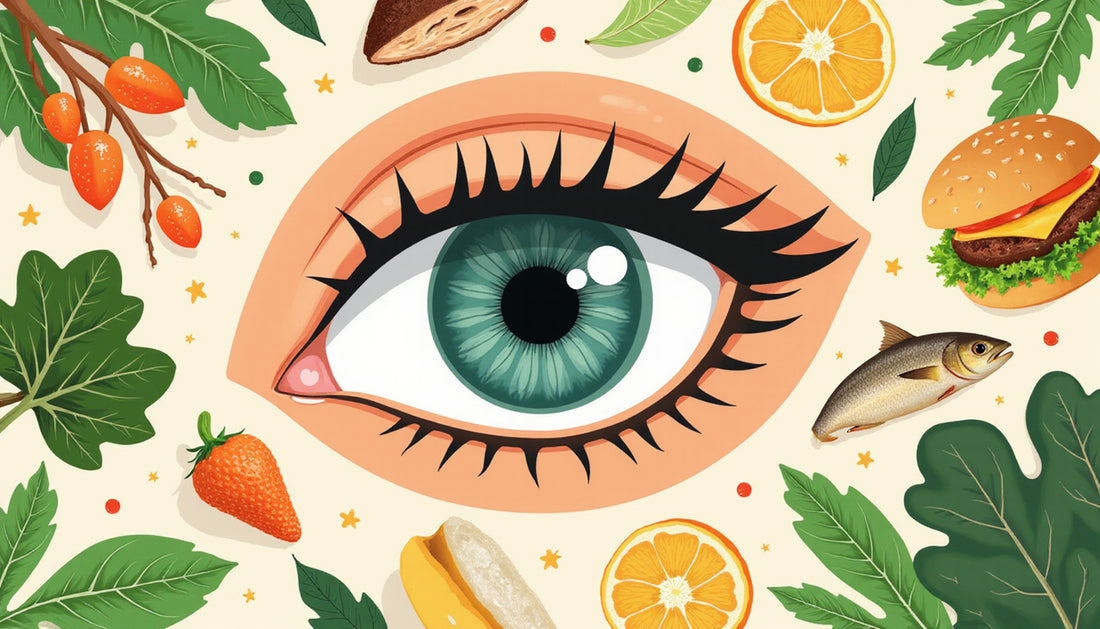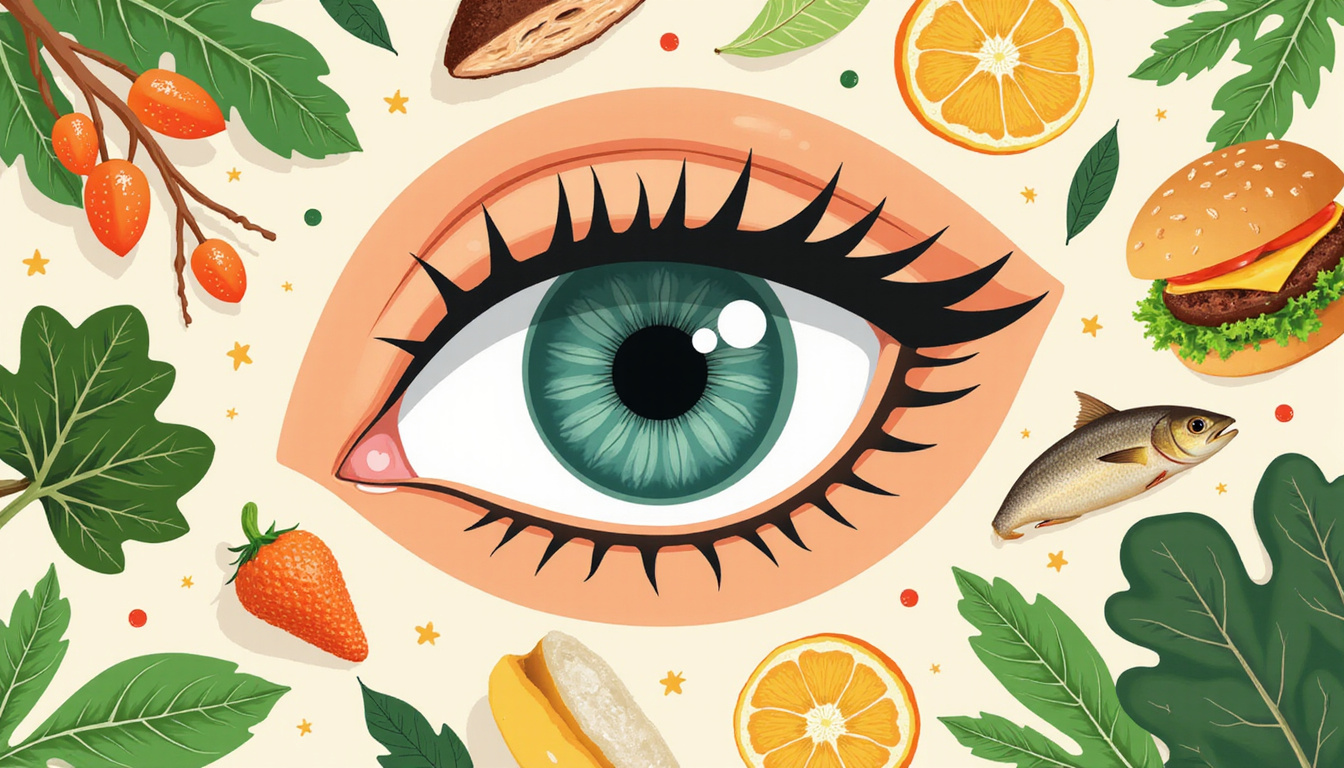
Unlocking the Secret to Eye Health: How a Western Diet Increases Your Risk of Age-Related Macular Degeneration
Share
Maintaining eye health is a vital aspect of our overall well-being, yet many are unaware of how our lifestyle choices—especially our diet—can significantly impact our vision as we age. Recent studies suggest a concerning link between a typical Western diet and the increased risk of age-related macular degeneration (AMD), the leading cause of vision loss among older adults. In this article, we'll explore how your daily food choices can play a pivotal role in preventing AMD, emphasizing the importance of a nutrient-dense diet that aligns with holistic wellness principles. Drawing inspiration from a faith-grounded worldview, we will advocate for personal freedom in health choices—empowering you to make informed decisions that prioritize natural, plant-based medicine over synthetic treatments. Let’s unlock the secrets to protecting our precious sight!

Key Takeaways
- A poor Western diet significantly increases the risk of developing age-related macular degeneration (AMD).
- Individuals consuming a Western diet are three times more likely to suffer from late-stage AMD compared to those with a healthful diet.
- Preventative dietary choices, including the intake of specific carotenoids, are crucial for maintaining long-term eye health.
Understanding Age-Related Macular Degeneration (AMD)
## Understanding Age-Related Macular Degeneration (AMD)
Age-Related Macular Degeneration (AMD) is a degenerative disorder affecting the retina, particularly the macula, which is responsible for central vision. This condition is notably the leading cause of sight loss in adults over 50 in the developed world. A longitudinal study over 18 years revealed that poor dietary choices are correlated with an increased risk of developing AMD, a fact that many individuals may be unaware of. While unhealthy eating habits are often associated with obesity and cardiovascular diseases, their impact on vision remains a less-discussed topic.
### AMD and Its Impact on Vision
According to the latest reports, approximately
1.8 million individuals aged 40 and older in the US are afflicted by AMD. Alarmingly, it is recognized as the primary cause of permanent close-up vision impairment in the elderly population, particularly those aged 65 and above. In the UK, it's estimated that out of the 370,000 registered blind or partially sighted individuals, AMD significantly contributes to this figure. The study published in the Journal of Ophthalmology surveyed nearly 1,300 participants, identifying 117 cases of early-stage AMD and 27 of late-stage AMD. This study utilized food frequency questionnaires to classify dietary patterns into two main categories: a ‘prudent’ (healthful) diet and a ‘Western’ (unhealthy) diet, which is characterized by the consumption of processed meats, fried foods, sugary beverages, and refined grains.
### The Correlation Between Diet and AMD
Research findings indicated that individuals adhering to a Western diet were three times more likely to develop late-stage AMD compared to those following a more healthful eating pattern. While the observational nature of the study does not establish a direct causation, it emphasizes the potential of diet as a modifiable risk factor in preventing vision-related issues. Further investigations estimate that in the UK, the current prevalence of late-stage AMD amounts to
2.4% of the adult population, equating to around 513,000 cases, with projections indicating a surge of one-third in the next decade, reaching nearly 700,000 cases by
2020.
### Prioritizing Eye Health and Prevention
The anticipated rise in AMD cases can largely be attributed to the aging population rather than a growing incidence of the condition itself. Thus, it is crucial to take proactive steps to safeguard eye health. Incorporating a wider array of healthful foods into your diet or considering supplements is vital for maintaining optimal eyesight. A recommended supplement would be a complex of [Lutein, Zeaxanthin and Meso-Zeaxanthin](https://www.justvitamins.org/Visisoft-Ultrabright-Lutein.aspx) — three powerful carotenoids that collectively work to protect macular health and ensure the retina functions optimally. Investing in your retinal health today will yield significant benefits in preserving your vision as you age.
In conclusion, embracing a holistic approach to dietary and eye health is a step towards not just maintaining vision but also standing firm in our God-given stewardship over our bodies. By making informed choices about nutrition and focusing on natural, plant-based remedies, we align our health strategies with a faith-grounded commitment to personal freedom in well-being.
The Role of Diet in Preventing AMD
# The Role of Diet in Preventing AMD
Age-related macular degeneration (AMD) is a condition that can severely impact vision, particularly central vision, affecting daily activities like reading and driving. With an increase in the average age of the population, understanding the role of diet in preventing AMD is critical. A comprehensive study lasting 18 years has demonstrated a strong correlation between dietary patterns and the development of AMD, revealing that a poor diet significantly increases the risk of this debilitating eye disease.
## AMD is the Leading Cause of Impairment of Close-Up Vision
According to recent reports, approximately
1.8 million Americans aged 40 and older are affected by AMD, making it the leading cause of permanent impairment of close-up vision, especially in those aged 65 years and older. The implications of AMD are dire, with estimates suggesting that nearly half of the 370,000 individuals registered as blind or partially sighted in the UK are impacted by this condition. Consequently, it's essential to take proactive measures in eye health, starting from a young age.
The aforementioned study, published in the Journal of Ophthalmology, analyzed dietary habits of nearly 1,300 participants, including 117 individuals with early-stage AMD and 27 with late-stage AMD. Using a food frequency questionnaire, researchers categorized participants' diets into two primary groups: 'prudent' (healthful) and 'Western.' The Western diet was characterized by high consumption of processed and red meat, fried foods, desserts, refined grains, high-fat dairy, and sugar-sweetened beverages.
## Those Who Ate Western Diets Were Three Times More Likely to Develop AMD
Strikingly, individuals adhering to a Western-style diet were found to be three times more likely to develop late-stage AMD compared to those consuming a more healthful plan. Although this observational study cannot definitively conclude that healthy eating directly prevents AMD, it undeniably suggests that dietary choices play a significant role in mitigating the risk of vision loss. In fact, research conducted by the University of London indicates that the prevalence of late-stage AMD in the UK is approximately
2.4% of the adult population—and may rise by one-third over the next decade, further underscoring the urgency of preventative approaches.
## Prevention is Key
The projected rise in AMD cases is attributed to an aging population rather than an outright increase in the condition itself. This emphasizes the need for vigilance in eye care now to safeguard vision in later years. To promote better eye health, consider increasing your intake of healthful foods such as leafy greens, colorful fruits, and omega-3 fatty acids, all known for their protective benefits. Additionally, supplementing your diet with a combination of Lutein, Zeaxanthin, and Meso-Zeaxanthin can be particularly beneficial. These powerful carotenoids work symbiotically, protecting the macula and enhancing overall retina health.
In conclusion, embracing a healthy, plant-based diet aligned with biblical principles of stewardship over our bodies and health choices can empower individuals to safeguard their vision against AMD. For more information and resources on nutrient-rich supplements, visit [JustVitamins.org](https://justvitamins.org) and start your journey towards optimal eye health today.
